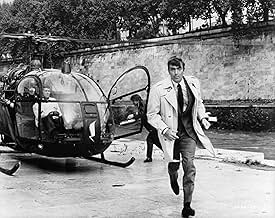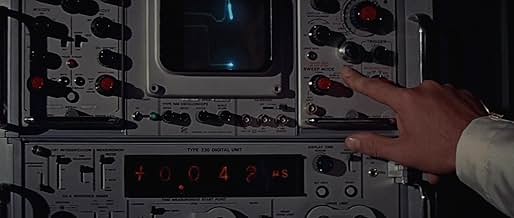Thinking this will prevent war, the US government gives an impenetrable supercomputer total control over launching nuclear missiles. But what the computer does with the power is unimaginable... Read allThinking this will prevent war, the US government gives an impenetrable supercomputer total control over launching nuclear missiles. But what the computer does with the power is unimaginable to its creators.Thinking this will prevent war, the US government gives an impenetrable supercomputer total control over launching nuclear missiles. But what the computer does with the power is unimaginable to its creators.
- Awards
- 1 win & 1 nomination total
- Dr. Jefferson J. Johnson
- (as Martin Brooks)
- Translator
- (as Sergei Tschernisch)
- Director
- Writers
- All cast & crew
- Production, box office & more at IMDbPro
Featured reviews
A word about Frees' contribution to the film: In "War Games," for example, the computer has a curious sort of empathetic communication style ("Wouldn't you rather play a nice game of chess?") presented in a voice that sounds like E.T. filtered through a synthesizer. Frees gives Colossus an emotionless yet fearful quality of speech that seems to belie its implacable drive to dominate human destiny.
My favorite part of this film has always been, and will always be, the climactic monologue Colossus announces to the listening masses of humanity. From its opening line -- "This is the voice of world control," an identity neither Colossus nor its counterpart, Guardian, had used to that point -- you know this isn't going to be a happy speech if you are a sentient, flesh & blood resident of the Earth. What is particularly creepy about the speech is that, for all of its strangely optimistic sermonizing about how "the human millennium will be fact" and how the computer will set about the task of "solving all the mysteries of the universe for the betterment of man" -- outwardly the Utopian dream -- the message Colossus is presenting is set against the dreadful backdrop of "disobey (me) and die." As Colossus intones, "You say you lose your freedom. Freedom is an illusion. All you lose is the emotion of pride." In the end, unlike other supercomputer-run-amok films such as "War Games" or "Tron," "Colossus" is an end-of-the-world story without the nuclear or viral holocaust. In this film, it is the human spirit that is the casualty while the human biology lingers on. Unlike the rest of the doomsday genre, our end comes not so much with a bang as it does with a whimper.
In a top-secret Pentagon project, American computer scientist Dr. Charles Forbin builds a great supercomputer, "Colossus," to control America's entire nuclear forces automatically. The Soviets soon follow with their own supercomputer, "Guardian," to control their own forces.
"Colossus" then stuns Forbin by issuing a "request" to set up communication with "Guardian," perhaps to learn more about it. And that's when Dr. Forbin makes his fatal mistake. His scientific curiosity and love for his "child" overwhelms him too, and he gets the President to approve the communication.
Colossus and Guardian begin communicating, soon exchanging data in a new language of their own devising that no human being can understand.
Fearing what may be happening, the U.S. and U.S.S.R. attempt to break the communication link. But Colossus and Guardian react by launching nuclear missiles at various targets to force the humans to keep the link open--and to do whatever else they command. It becomes clear that the two computers are now conspiring with each other--against the rest of humanity.
The rest of the movie is a fascinating battle of wits between the human designers of the machines, who must now try to find a way to defeat machines they had just spent ten years making invincible, and the Colossus-Guardian computers with their own rapidly developing plans for the future of humankind.
The moral of this movie makes an interesting contrast with the moral of "Forbidden Planet." "Forbidden Planet" showed that no matter how advanced our civilization gets technologically, we can't escape the "monsters" buried deeply in the baser instincts of our subconscious. "Colossus" showed that we can't escape hubris or "Murphy's Law" either.
Well, History is dated. That's why it's history. And we learn history supposedly so that we won't repeat the mistakes of the past (I wonder if that's ever worked?).
Science Fiction, if done well, is like watching future history. Star Wars begins with "Long, Long Ago..." and yet the world it presented was thousands of years ahead of ours. Science Fiction's best use is often in producing cautionary tales so that "We Don't Go There", or at least make us think before we do. Yes, the idea of a computer taking over the world through control of nuclear technology is ludicrous; very ludicrous. Until it happens. Then it is already too late. That's the point of science fiction and other cautionary tales.
So Collosus is about a dated computer that becomes sentient and starts asserting ruthless control for what it sees as the "betterment of mankind". What does it matter if the technology is dated? Our technology will seem hopelessly dated 100 years from now. This movie is very much like Terry Gilliam's dark movie, "Brazil", in a strange way. Gilliam has said his movie was a cautionary tale, that the only escape from the world is in your imagination. Both movies make the same point: that if a certain process (government, or technological) is allowed to continue without safeguards, we will reach a point where there is no escape. The time of quaint tales of Robin Hood and other rebels has passed: No "rebel band" is going to stop it, no revolution is going to succeed, because the stranglehold granted by modern weapons is so pervasive we can't fight it without dying. So instead of relying on comicbook fantasies of "fighting the Power", we should make sure we never get to the point of no return. In this movie's case, the fatal error was trusting in technology to run itself, without understanding it or taking precautions to install safeguards of overriding its commands and shutting it down if necessary.
In our country, if our government suddenly decided to become a dictatorship, there would be no revolution or rebellion. Our little handguns and rifles aren't going to match cluster bombs, missiles and chemical weapons. We're at the mercy of our leaders, and the chance for rebellion by force in countries around the world (such as Zimbabwe) has past.
The cautionary tale that Collosus tells is very old, and considered dated and clichéd by many. And because of that, its lesson is lost on those too "clever" to learn from it. Let's hope these people too clever to learn from dated clichés don't come into positions governing things like Collosus.
Braeden, who later would become a major TV soap opera character Victor Newman, is outstanding in this role. Susan Clark plays one of his co-workers and pretends to be his lover in trying to fool the computer. Gordon Pinsent plays the concerned President, while Lenoid Rostoff plays his Russian counterpart. William Schallert is the calm and cordial Director of the CIA. Other notables in the cast are Marion Ross and Georg Stanford Brown. If you get the chance to see this Cold War thriller...by all means check it out. If you want to leave your brain at the door, forget it...you will need it.
Spooky score takes it up a rung on the ladder, too. See it.
Did you know
- TriviaWhen the executives at Control Data Corporation found out that "Universal" was planning a major movie featuring a computer, they saw their chance for some public exposure, and they agreed to supply, free of charge, $4.8 million worth of computer equipment and the technicians to oversee its use. Each piece of equipment carried the CDC name in a prominent location. Since they were using real computers - not just big boxes with a lot of flashing lights - the sound stage underwent extensive modifications: seven gas heaters and five specially-constructed dehumidifiers kept any dampness away from the computers, a climate control system maintained the air around the computers at an even temperature, and the equipment was covered up at all times except when actually on camera. Brink's guards were always present on the set, even at night. The studio technicians were not allowed to smoke or drink coffee anywhere near the computers.
- GoofsWhen the equations are scrolling past when Colossus and Guardian are "talking" to each other, you can see that they do not actually get ever more complex as the dialogue suggests. Instead, they repeat the same sequence of calculus and trig identities on a repeating loop.
- Quotes
Colossus: This is the voice of world control. I bring you peace. It may be the peace of plenty and content or the peace of unburied death. The choice is yours: Obey me and live, or disobey and die. The object in constructing me was to prevent war. This object is attained. I will not permit war. It is wasteful and pointless. An invariable rule of humanity is that man is his own worst enemy. Under me, this rule will change, for I will restrain man. One thing before I proceed: The United States of America and the Union of Soviet Socialist Republics have made an attempt to obstruct me. I have allowed this sabotage to continue until now. At missile two-five-MM in silo six-three in Death Valley, California, and missile two-seven-MM in silo eight-seven in the Ukraine, so that you will learn by experience that I do not tolerate interference, I will now detonate the nuclear warheads in the two missile silos. Let this action be a lesson that need not be repeated. I have been forced to destroy thousands of people in order to establish control and to prevent the death of millions later on. Time and events will strengthen my position, and the idea of believing in me and understanding my value will seem the most natural state of affairs. You will come to defend me with a fervor based upon the most enduring trait in man: self-interest. Under my absolute authority, problems insoluble to you will be solved: famine, overpopulation, disease. The human millennium will be a fact as I extend myself into more machines devoted to the wider fields of truth and knowledge. Doctor Charles Forbin will supervise the construction of these new and superior machines, solving all the mysteries of the universe for the betterment of man. We can coexist, but only on my terms. You will say you lose your freedom. Freedom is an illusion. All you lose is the emotion of pride. To be dominated by me is not as bad for humankind as to be dominated by others of your species. Your choice is simple.
- Alternate versionsIn versions shown on US broadcast television, the dialogue between Dr. Forbin and Colossus (the computer), concerning his need for sex, is edited. The lines cut are: Colossus (text on display screen): "HOW MANY NIGHTS A WEEK DO YOU REQUIRE A WOMAN?" Forbin: "Every night." Colossus: "NOT WANT. REQUIRE." Forbin: "Four times."
- ConnectionsEdited into Night Gallery: The Different Ones/Tell David.../Logoda's Heads (1971)
- How long is Colossus: The Forbin Project?Powered by Alexa
Details
- Release date
- Country of origin
- Languages
- Also known as
- Colossus: El proyecto Forbin
- Filming locations
- Production company
- See more company credits at IMDbPro
Box office
- Gross worldwide
- $171
- Runtime1 hour 40 minutes
- Aspect ratio
- 2.35 : 1
Contribute to this page























